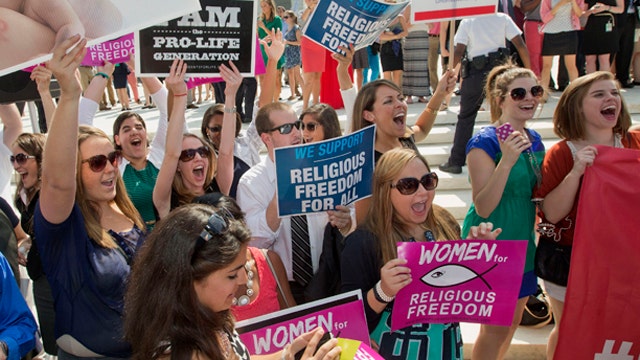Hobby Lobby supporters: High court decision a win for women
Family Research Council clears up misconceptions about ruling on birth control mandate
Any time ObamaCare is in the headlines -- especially when its various mandates are concerned -- it reminds opponents why they don't like the law.
This week's Supreme Court decision limiting the law's requirement on employers to provide free contraceptive coverage was no different.
"I think it's a reminder of how many things ObamaCare regulates it would never have occurred to you a federal law should regulate in the first place," said Avik Roy, of the Manhattan Institute.
The 5-4 decision ruled that certain "closely held" for-profit businesses can opt out of the mandate by citing religious objections.
Two years ago, the court upheld the law's so-called "individual mandate" -- the requirement on individuals to buy health insurance. But together with a prior decision reining in the law's Medicaid expansion, the decision in the case brought by arts-and-crafts chain Hobby Lobby and other businesses marked a blow for the law and a reminder for critics of its reach. (Hobby Lobby provides coverage for 16 of 20 forms of contraception, but objected to those it claims can work after conception.)
Joe Antos, of the American Enterprise Institute, said it "touches on issues related to what is the power of the president versus the power of the Congress to decide how we run our lives."
Kellyanne Conway, who polls on issues affecting women, noted the health care law has struggled to win public approval.
"The majority of the Americans in everyone's polling rejects the Affordable Care Act as way too intrusive and invasive and also way too expensive for them," she said.
Several polls have uncovered deep skepticism about the law. A Fox News poll from late June found a 56 percent majority disapprove of President Obama's handling of health care while only 41 percent approve.
A poll from early June found 55 percent wish the law had never passed, compared with 38 who said the opposite.
In the same poll, 44-29 percent said the country will be worse off under the law, while 24 percent say it'll make no difference.
The court case once again raises the issue ahead of looming midterm elections. Democrats are using the ruling to highlight the impact on women, and defend the law's intent of providing contraceptive coverage to female employees.
But Republicans are likely to highlight the rebuke to the law itself.
"The election isn't for another few months," Antos said, "and I think there will be other issues that will come up that will remind people that this is not the law that they would have hoped for."
Roy added that "this whole case was really about showing that ObamaCare's ability to regulate every aspect of the way the private sector and private economy works was not appropriate."
In mid-week, a poll by Bankrate.com found 68 percent of Americans say ObamaCare will play a role in deciding how they vote this fall. Thirty-two percent said they're more likely to vote Republican, while 26 percent said they're more likely to vote Democrat.
And 52 percent, according to the poll, would like to see the new Congress make changes in the law, while only 12 percent of Americans want to keep it exactly as it is.













































